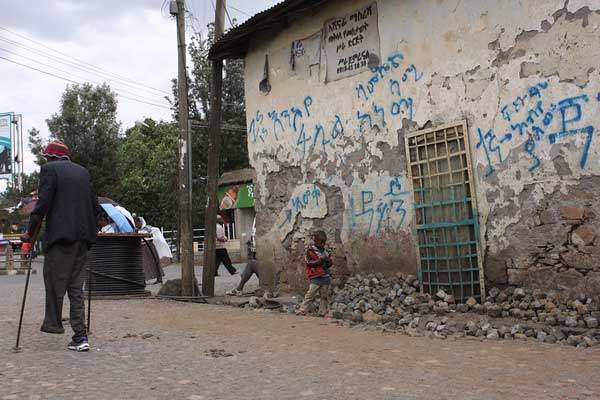Ethiopian Government Must Prioritize Access To Quality Surgery in Post-War Reconstruction

ADDIS ABABA, Mar 30 (IPS) - There are about 5 billion people globally who cannot access surgery. In Ethiopia, for every 5,000 needed surgeries per 100,000 people, the country’s health system can only provide 192. Yet, this is Africa’s second largest population, with over 120 million people.
The statistics are worrying. This is further exacerbated by a recently ended two-year war in the northern part of the country that devastated among others, the health sector. There is however an opportunity to build back better as the government institutes post-war reconstruction. This is possible through prioritizing access to surgical care as part of restoring the country’s health system in post-war reconstruction efforts.
Armed conflict increases the demand for health services yet hampers the system’s ability to deliver these services as it disrupts the supply chain, results in direct damage to health facilities, and forces health workers to flee their duty stations. In Ethiopia, unofficial estimates put the proportion of health workers who fled their duty stations at over 90% of the pre-conflict numbers.
The cumulative needs of injured patients from the war have created a medical crisis. It is a vicious cycle whose victims are innocent civilians. Take for instance patients with open fractures and bullet wounds who require some form of reconstructive surgery. This service is largely unavailable in affected regions, particularly in Tigray. If left untreated, these injuries can result in infections, amputation, permanent disability, or even death.
This was the case for 17-year-old Hakeem* (not his real name). He suffered bone and nerve damages as a casualty of the war. Hakeem was facing the threat of disability from abnormal bone healing and wrist-drop, which is paralysis of the muscles that enable hand function.
Fortunately, he received surgical care that allowed him to return to his daily activities with reduced physical challenges. Not many people have been as lucky. Reports show that over 100,000 people died from lack of access to medical care in war time. This includes lack of access to surgical care.
Additionally, the influx of surgical patients owing to the war has slowed down the already strained health system’s ability to provide non-emergency surgical care. Although not life threatening, these surgical needs have a major impact on improving the quality of life of those in need.
These include cleft lip and cleft palate, which are birth defects that occur when a baby's lip or mouth do not form properly during pregnancy. Failure to correct this, often results in social and economic exclusion of patients who are often ostracized by their communities for allegations based on false and harmful cultural and religious beliefs including their participation in witchcraft.
Arguably, the Federal Government of Ethiopia has indeed made efforts toward the rehabilitation of health infrastructure in conflict areas. For example, the government’s effort to restore 36 hospitals in Afar and Amhara. There is however much more to be done. Rebuilding the health system will cost the country an estimated 74.1 billion ETB (Approx. US$1.4 billion).
To restore all social service infrastructure- including health facilities damaged by conflicts in the country, the government has allocated 20 billion ETB into the capital budget for the current fiscal year. This is way below the requisite threshold to rebuild the health services alone.
There is indeed urgent need to prioritize surgical care at the forefront of rehabilitation efforts. The Ministry of Health must provide health workers - including specialist surgical and anesthesia workforce with monetary and non-monetary incentives to return to their pre-war duty stations to fill the gaping vacuum in human resourcing.
The federal government must allocate resources towards the rehabilitation and equipping of all health facilities including surgical theatres in northern Ethiopia. This budgetary allocation must be included in the 2023/2024 budget cycle (2016 Ethiopian fiscal year). Critics could argue that there is simply not enough money to this end.
While the government could be cash-strapped to rebuild different sectors of the economy; it is its ultimate responsibility to ensure the life and health of its citizens. It must therefore seek innovative ways to fund reconstruction efforts. One such way could be through leveraging public private partnerships.
Not only will this provide the necessary funds but has the prospect of being an accountability mechanism to ensure lasting peace as a condition of the disbursement of funds or gifts in kind. These would be tangible steps towards reconstruction, alleviating the suffering of Ethiopians who without these services, continue to suffer preventable medical conditions and deaths.
Abdo Husen is a public health specialist by training, Program Lead at Operation Smile Ethiopia, and a 2023 Global Surgery Advocacy Fellow
© Inter Press Service (2023) — All Rights Reserved. Original source: Inter Press Service
Where next?
Browse related news topics:
Read the latest news stories:
- Water and Food Security in Europe and Central Asia: A Shared Challenge for a Sustainable and Just Future Friday, March 28, 2025
- Latin America & the Caribbean in 2024: Renewable Energy and Early Warning Systems Offer Hope Amid Climate Extremes Friday, March 28, 2025
- Marley, Music, Morris, Life: A Photo Voyage in Paris Friday, March 28, 2025
- The Giant Plastic Tap: How art fights plastic pollution Friday, March 28, 2025
- UNICEF Report Warns of Rising Rates of Child Mortality without Proper Funding Friday, March 28, 2025
- Building Resilience in Least Developed Countries – A Pathway to Sustainable Transformation Friday, March 28, 2025
- Haiti reaches ‘yet another crisis point’ as gangs tighten their grip Friday, March 28, 2025
- Despite renewed conflict in eastern DR Congo, protection for civilians is paramount: Keita Friday, March 28, 2025
- Tens of millions risk starvation as funding cuts deepen crises in DR Congo: WHO, WFP Friday, March 28, 2025
- ‘Perfect storm’ in South Sudan demands urgent action, says Guterres Friday, March 28, 2025